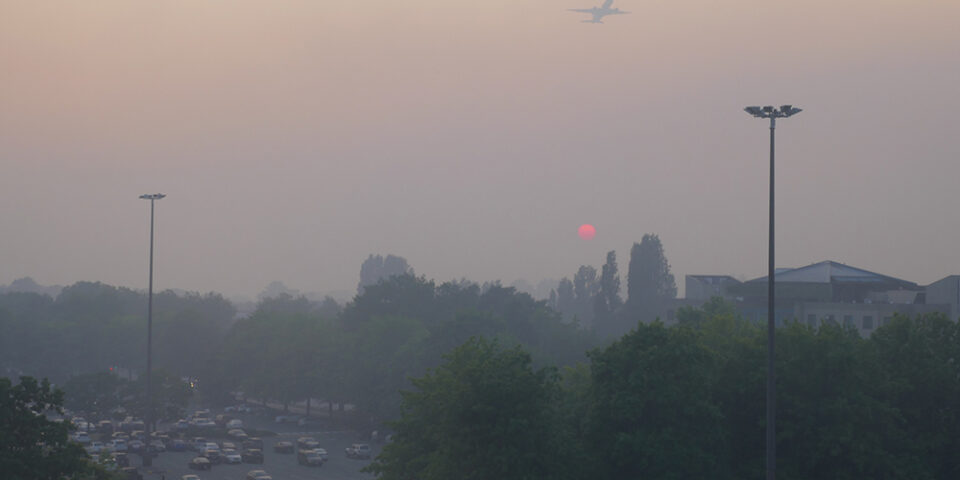What to do during an air quality alert – and why
An air quality alert comes across your phone, but the sky is clear and the weather seems fine. It’s easy to just ignore it and go about your day, but pulmonologist Todd Gandy, MD, explained why it’s important to take precautions when an air quality alert is announced.
Why are air quality alerts issued?
Air quality alerts are intended to notify you about poor air quality conditions that could potentially pose health risks. They are typically issued when certain pollutants in the air, such as ozone, particulate matter (microscopic particles), carbon monoxide, sulfur dioxide or nitrogen dioxide, reach levels that are considered unhealthy. This pollution can be caused by human activities such as industrial manufacturing processes and vehicle emissions, as well as wildfires and weather conditions.
The Environmental Protection Agency (EPA) uses the Air Quality Index (AQI) as a measure for reporting air quality. The AQI is divided into six categories:
- 0 to 50 = Good air quality
- 51 to 100 = Moderate air quality
- 101 to 150 = The air is unhealthy for sensitive groups
- 151 to 200 = The air is unhealthy for everyone
- 201 to 300 = The air is very unhealthy for everyone
- 301+ = Hazardous air quality
How does poor air quality impact your health?
Everything we’re exposed to can impact our lungs and our breathing. If we’re healthy, our bodies won’t often react to the things we’re exposed to in the environment. But if you have a chronic lung condition, such as COPD or asthma, your body can overreact.
“These elements we’re exposed to in the environment can travel down into the bronchial tubes (air tubes), into the distal portions of our lungs, and the immune system can react in an adverse way and cause inflammation,” Dr. Gandy explained. “Folks with COPD and asthma are already susceptible to inflammation in the air tubes. They live with chronic inflammation. Fortunately, we have very good medications that can help reduce the inflammation and help minimize the symptoms they deal with. But when we’re exposed to pollen, fumes or smoke in the environment, those things can increase the amount of inflammation patients with those problems deal with.”
Inflammation causes swelling in the bronchial tubes and makes breathing more difficult.
“Oftentimes, patients will say it’s more difficult as they breathe out, as opposed to breathing in,” Dr. Gandy said. “That’s actually a hallmark of an asthma symptom – wheezing – brought on by these substances causing inflammation within the lungs.”
How can you protect your health when air quality is bad?
Dr. Gandy suggested taking these precautions, particularly if you have a chronic lung condition such as COPD or asthma, when air quality is poor.
Stay indoors. Try to limit your exposure as much as possible. “If you’re going outside for exercise or recreation, go early in the morning or later in the evening to avoid the heat of the day,” Dr. Gandy said. “Exercising in an indoor setting or local gym or even a local public swimming pool can be great options.”
Be aware of your health. Look out for symptoms such as increased shortness of breath, chest tightness, cough or wheezing, runny nose and itchy, runny eyes. Head to the ER if you notice any alarming symptoms.
“Many folks who have bad asthma, COPD or allergies often know what their triggers are,” Dr. Gandy said. “It’s always good to keep your health care team informed as to how you’re feeling. Stay in tune to your body and try and be proactive instead of reactive. Also, make sure that you’re up to date on your medications and that you have refills available for your essential medications.”
Take your meds. “We all have a tendency to miss a dose here or there,” Dr. Gandy said. “There are certain times of the year when air quality can be poor. During those times, it’s very important to make sure you’re taking your medications as prescribed, whether those are inhalers or oral medications that help support your lung health.”
Stay informed. Keep an eye on local air quality using airnow.gov or check your local weather station for updates.
The bottom line when it comes to air quality
Whether you have a respiratory condition or not, it’s important to pay attention to air quality alerts and take precautions. Even healthy people can experience temporary symptoms from exposure to polluted air.
Find a doctor
Whether you’re looking for a primary care physician or need to see a specialist, we’re here to help with experienced, compassionate care near you.
Find a Doctor

